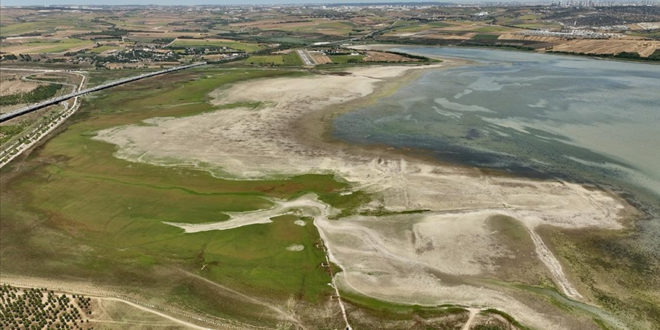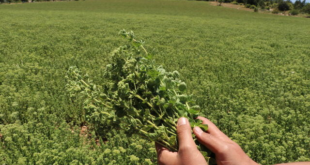ANKARA…
The Agriculture and Forestry Ministry has issued a stark warning about the impending impact of drought on Türkiye’s agricultural sector, specifically pointing to a significant decrease in the production of vital crops and its adverse effects on animal husbandry.
The ministry, which highlights the potentially devastating consequences until 2050, underscores the urgent need for water conservation measures and proactive solutions to mitigate the crisis.

The report, focusing on strategic crops such as wheat, barley, corn and sunflower, predicts an 8.18 percent reduction in wheat production, a 2.24 percent decrease in barley production, a 9.11 percent drop in corn production, a 4.53 percent decline in cotton production, and a substantial 12.89 percent decrease in sunflower production due to yield losses.
This alarming trend is expected to severely impact the agricultural landscape, particularly in regions such as the central Konya basin, one of the country’s most significant agricultural hubs.
In response to the findings, the ministry has finalized an environmental assessment report for the Konya basin, proposing several measures to counter the negative effects of drought.
Recommendations include raising public awareness about water conservation, licensing unregistered wells, and ensuring all water sources used for irrigation, including those for religious purposes such as mosques and fountains, are utilized judiciously.

The drought’s ripple effect extends to the livestock sector, where diminished feed resources are expected to lead to the early slaughtering of cattle due to diseases caused by intensive feeding practices.
This situation is likely to escalate production costs for farmers, potentially resulting in financial strain for small-scale breeders and forcing some to abandon their agricultural endeavors altogether.
Meanwhile, Adil Tek, the head of the meteorology laboratory at Boğaziçi University’s Kandilli Observatory, emphasized the urgency of implementing water conservation measures, especially in Istanbul, where the water level in dams has plummeted to a critical 17 percent.
Tek stressed the necessity of injecting society with the awareness of using water sparingly, comparing it to the imperative preparedness for earthquakes.
According to the expert, the dry period since last spring persists, and last week’s rainfall, though welcomed, was insufficient to alleviate the drought crisis.

The water levels in three out of the ten dams supplying water to the country’s largest city have recently plummeted dangerously, falling nearly 3 percent, according to data from the Istanbul Water and Sewerage Administration (İSKİ).
In the Sazlıdere dam, the water level has dwindled to 2.77 percent, while this figure has fallen to 3.45 percent in the Pabuçdere dam.
The most profoundly affected dam by the drought, Büyükçekmece dam, has witnessed a sharp drop in water level from 46.64 percent to a mere 3.97 percent during the same period, marking the lowest recorded level in the past 11 years.
Addressing the long-term outlook, experts and authorities concur that comprehensive solutions are imperative not only for Istanbul but also for the entire country, grappling with the devastating effects of the climate crisis.
www.hurriyetdailynews.com
 THE GLOBAL WINDOW OF TURKISH FOOD AND AGRICULTURE The Global Window of Turkish Food and Agriculture Sector
THE GLOBAL WINDOW OF TURKISH FOOD AND AGRICULTURE The Global Window of Turkish Food and Agriculture Sector









